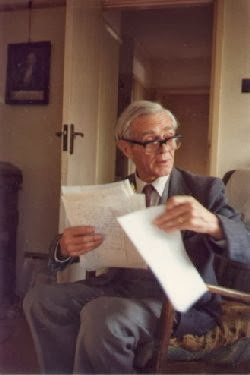'Owen Barfield: Romanticism Come of Age - A biography' by Simon Blaxland-de Lange is a heap of a book. It is as if the author had collected all that he could find, then sorted it into an unusual order (after starting with Barfield's own reminiscences in his nineties, we track backwards in time) and stopped half way. A great deal of material is here, much of great interest, for which we must deeply thank the author, but you finish it yearning for a more comprehensive, guiding intelligence to have been applied to help you through the thinking of this myriad minded man of great intelligence and sensitivity.
It may be a subtle anthroposophical exercise: your ability to make order of the material indicative of the state of your own consciousness!
For Barfield, described by C. S. Lewis as possessing the best mind of all his friends, was a devoted, if not uncritical, disciple of Rudolf Steiner (indeed Steiner would have expected that any of those who followed his pattern of thinking would do so only on the basis of their own reflective experience, a feature that immediately makes him a potentially congenial teacher).
What struck me reading this biography (in the highly congenial setting of the restaurants of Lisbon) was the dual aspect of Barfield's thinking. He was a man that had highly original things to say within the main currents of academic and intellectual life on the origins of language, on poetic diction or on the nature of Coleridge as a thinker. After he retired from the family law firm, he enjoyed a number of distinguished visiting professorships at American universities.
But all of this diligent exploration was framed within a wider commitment to Steiner and, most especially, to understanding the world as a place where the central fact of human existence was that our consciousness evolves, who we are now is radically different from our ancestors and will emerge as different again in the unfolding fullness of time. This dynamic unfolding is essentially a spiritual, sacred process whose unfolding parameters are not shared by the very academic world that is lauding his exploration of language and his scholarship on Romanticism.
At the heart of evolving consciousness is the desire to heal the split between an 'objective' world out there, the realm of fact, and the 'subjective' world in here, the realm of value. Barfield's achievement was to help show that 'out there' mutually arises (and is conditioned by) 'in here'. The world we perceive is conditioned by our framing but, unlike Kant, our framing evolves over time and is subject potentially to critical examination and development. The first part of this 'truth' would be self-evident to the metaphysicians of Buddhism and Hinduism that the world is a product of our consciousness. Barfield's achievement was to show how we might understand it within a 'Western' frame and see it as part of an unfolding narrative of the world's evolving purpose. The novelty lies in the evolution of our framing.
Why is this critical? Because, at present, we are dangerously bifurcated. We do not recognise that the world we are creating flows not from some objective demand (the scientific facts, the market, how things really are) but from how we chose to perceive things (though this 'choice' can be deeply unconscious). The world we behold is the one we expect and that our current path of expectation is deeply flawed because it assumes a world of isolated objects connected outwardly and mechanically. A world temptingly manipulable by our most superficial selves. Barfield offers us a way of seeing that genuinely 'cleanses the doors of perception' and allows us to bring what we value more deeply into alignment with the potential of what may come into being. Barfield is, like Blake, a defender of the creative imagination as the lodestone of truth.

Comments
Post a Comment